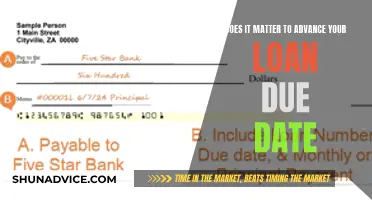
Whether you're buying a car, a house, or something else entirely, it's worth considering the pros and cons of paying with cash or loan proceeds. Loan proceeds refer to the money you receive when a lender disburses a loan, which is typically transferred directly into your bank account. While you may have more flexibility with cash, loans can help you make large purchases that you may not be able to afford otherwise. It's important to note that loan purpose matters, as lenders need to determine whether the money will be used for something they allow, and it can impact the amount, interest rate, and terms you qualify for.
| Characteristics | Values |
|---|---|
| Loan purpose | Lenders need to determine if the money will be used for something it allows. Some lenders have specific restrictions on what funds can be used for. |
| Loan amount | The total amount you agree to borrow. |
| Loan proceeds | The funds you receive after fees and expenses are deducted from the loan amount. |
| Loan proceeds vs. loan amount | Loan proceeds are usually less than the loan amount because of fees and expenses deducted by the lender. |
| Loan proceeds as income | Loan proceeds are not considered income and are not subject to income tax. |
| Cash purchase | Avoids additional debt and interest costs. |
| Loan purchase | Allows you to invest the money saved from paying cash, potentially earning more than the interest on the loan. |
What You'll Learn

Loan purpose and lender restrictions
When applying for a loan, the lender will typically ask about the purpose of the loan and how you plan to use the funds. While some lenders may not check to see if the funds are being used for the purpose stated in the application, it is important to be honest about your intended use. Lying to a lender about your loan purpose could lead to legal trouble.
Lenders care about the purpose of a loan because they have certain limitations on how the money they lend can be used. For example, a lender may place restrictions on using a personal loan to pay for college tuition, repay another loan, purchase a home, or start a business. Some lenders only offer loans for specific purposes, such as debt consolidation. Additionally, the loan purpose can impact the amount, interest rate, and terms of the loan.
Most lenders will allow you to use loan proceeds however you see fit. However, some lenders do impose usage restrictions. These restrictions typically fall into the following categories:
- Down payment on a home using an FHA or conventional mortgage
- Educational expenses and tuition
- Business-related expenses
- Gambling
Before taking out a loan, it is important to compare lenders to see which one offers the best rates and terms based on your credit and needs. Prequalifying with multiple lenders can help you find the best loan offer for your intended purpose without hurting your credit.
Hospital Bills: Impacting Loan Decisions?
You may want to see also

Cash purchases and seller preferences
Cash purchases are often more attractive to sellers due to the speed, certainty, and simplicity they bring to the home-selling process. Cash deals don't rely on loan approvals or appraisals, reducing the risk of delays or the deal falling through. This means sellers can get to the closing table faster and with less paperwork. In a competitive market, a seller is likely to favour a cash offer as they don't have to worry about buyers backing out due to financing issues.
However, it's important to note that a cash offer might not always earn the seller the best price. Financed offers can sometimes provide a higher sales price, so it depends on the seller's priorities—whether they value speed and simplicity or maximising profit. Additionally, in a multiple-offer situation, a 20% down offer might not be sufficient for most sellers if there are other offers with larger down payments or all-cash bids.
As a buyer with a loan, there are a few strategies to consider when competing with cash buyers. Firstly, try to avoid multiple-offer situations by bidding on properties that have been on the market for a while, are overpriced, or need work. Secondly, work with your agent to find off-market properties, which may involve signing a buyer broker agreement. Thirdly, evaluate which areas might be less competitive and suit your needs, offering better odds and deals. Lastly, find ways to make your offer less risky to the seller, such as providing assurances or demonstrating your financial reliability.
Early Exit Counseling: Does It Affect My Loan?
You may want to see also

Loan proceeds and taxation
In general, personal loans are not considered taxable income by the Internal Revenue Service (IRS) because they are usually repaid. However, if a loan is forgiven, it becomes taxable as cancellation of debt (COD) income. In this case, the borrower will receive a 1099-C tax form for filing.
The giver of loan forgiveness may need to file a gift tax return if their gifts to an individual exceed the gift tax reporting threshold for that year. The tax code requires that any gift loan of $10,000 or more have imputed interest, which the giver of the loan must report as interest income, even if they did not collect interest.
There are some exceptions to the rule that personal loan interest is not tax-deductible. For example, interest on personal loans may be tax-deductible if an individual uses the loan proceeds for business or qualified higher education expenses or to purchase taxable investments such as stocks or mutual funds.
Additionally, workers in certain professions may have their student loans canceled tax-free. For instance, the American Rescue Plan, passed by Congress and signed by President Joe Biden in March 2021, includes a provision that student loan forgiveness issued between January 1, 2021, and December 31, 2025, will not be taxable to the recipient.
Helco Modification: Does ICCU Provide Loan Options?
You may want to see also

Personal loans and their uses
Personal loans are a versatile type of funding that can be used for a variety of purposes, including debt consolidation, home improvements, and large purchases. They can be especially useful for unexpected or emergency expenses, such as medical bills or car repairs.
One of the most common uses for personal loans is debt consolidation. Balances on high-interest credit cards and other debts can be difficult to manage and often come with costly finance charges. A personal loan can be used to combine these balances into a single monthly payment at a low fixed rate, making it easier to handle and saving money over time.
Personal loans can also be used for home improvements and repairs, such as installing new pipes, rewiring your house, or adding new windows or floors. They can be a quick way to access funds to cover necessary repairs or renovations, which can then be repaid in manageable instalments.
Large purchases, such as appliances, electronics, furniture, or even a car, can also be made using personal loans. While an auto loan may offer a lower interest rate, a personal loan can be a good alternative if you don't want to put up your car as collateral. Personal loans can also be used for purchases such as an RV, boat, or motorcycle, which some lenders may not offer specific loans for.
It is important to note that personal loans should not be used for certain purposes, such as college tuition, down payments on a home, or business expenses. Lenders often restrict the use of personal loans for these purposes. Additionally, it is always essential to carefully consider the terms and conditions of a personal loan before taking one out, as they can come with varying interest rates and repayment periods.
Understanding Your Rights to Your Spouse's 401(k) Loan
You may want to see also

Cash vs. loan: pros and cons
When it comes to making a purchase, there are various factors to consider when deciding between using cash or taking out a loan. Here are some pros and cons of each option:
Cash:
Pros:
- No additional debt: Paying with cash means you avoid taking on any extra debt, which can provide more financial freedom and flexibility.
- No interest charges: You won't have to pay any interest on the amount, which can result in significant savings over time.
- Attractive to sellers: Sellers often prefer cash offers as they don't have to worry about loan denial impacting the sale, and the process can be faster and more straightforward.
- No loan restrictions: When using your own money, you are generally free to spend it as you wish, without the restrictions that may come with loan proceeds.
Cons:
- Opportunity cost: If you have a large amount of cash readily available, there may be more beneficial ways to use it, such as investing it to earn returns.
- Less negotiating power: In certain situations, such as when buying a car, keeping your cash intentions to yourself may be advisable, as some salespeople associate cash purchases with lost opportunities for commissions and upsells.
Loan:
Pros:
- Leverage: Taking out a loan allows you to leverage your money and make purchases you may not be able to afford outright.
- Potential for growth: If you take out a loan while investing your existing funds, you could potentially grow your wealth over time.
- Liquidity: Taking on a loan can help maintain your liquidity, allowing you to hold onto your cash for other purposes or investments.
- Ease of access: In some cases, such as with personal loans, funds can be relatively easy to access and may not require perfect credit scores.
Cons:
- Interest and fees: Loans usually come with interest charges and various fees, such as origination, processing, or prepayment penalties, which can increase the overall cost.
- Debt burden: Taking on a loan means you will have a long-term debt obligation, which can impact your financial decisions and freedom.
- Restrictions: Lenders often have specific restrictions on how loan proceeds can be used, and these restrictions vary depending on the loan type and purpose.
Whether paying with cash or taking out a loan is the better option depends on your individual circumstances, the purpose of the purchase, and your financial goals and capabilities. It is always advisable to carefully consider your options, seek professional financial advice if needed, and make informed decisions that align with your specific situation.
HSBC's Lending Future: Will They Continue Offering Loans?
You may want to see also
Frequently asked questions
Loan proceeds are the funds distributed from a loan, less any closing costs. They are the actual cash transferred into your account after loan approval.
A major advantage of paying with cash is avoiding additional debt. Paying with cash also eliminates the cost of interest on the loan and any closing costs. However, if you pay with cash, you may miss out on the opportunity to invest the money you save in a way that earns you more than you would have paid in interest on the loan.
The pros of purchasing with loan proceeds are that you can invest extra money instead of using it for your purchase. You may also be able to get better deals on your purchase, as salespeople can receive commissions on loans. However, purchasing with loan proceeds means you will have to pay interest on the loan.







